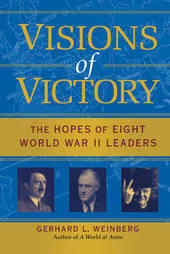
|
Visions of Victory: The Hopes of Eight World War II Leaders
Hardback
Main Details
Description
Visions of Victory explores the views of eight war leaders of the major powers of World War II - Hitler, Mussolini, Tojo, Chiang Kai-shek, Stalin, Churchill, de Gaulle, and Roosevelt - and compares their visions of the future. Astonishing in its synthesis and scope, Weinberg's comparison of the individual portraits of the war-time leaders is a highly-original and compelling study of history that might have been. What emerges is a startling picture of postwar worlds: besides the extermination of the Jews, Hitler intended Germans to inhabit all of Eastern Europe. Both Mussolini and Hitler intended to have extensive colonies in Africa. Churchill hoped to see the re-emergence of the British and French empires. De Gaulle wanted to annex the northwest corner of Italy. Stalin wanted to and achieved control of Eastern Europe. Roosevelt's vision of the future was the closest to being fulfilled, including, the establishment of the United Nations.
Author Biography
Gerhard L. Weinberg is Professor Emeritus of History at the University of North Carolina, Chapel Hill. He is the author of numerous books and articles on the origins and course of World War II, including A World At Arms: A Global History of World War II (Cambridge, 1994), which won the George Louis Beer Prize of the American Historical Association, and Germany, Hitler, and World War II (Cambridge, 1995).
Reviews'Gerhard Weinberg is probably the world's leading expert on Hitler's foreign policy ... Visions of Victory is a beautifully written and wide-ranging synthesis of a large and burgeoning literature. It is based on deep knowledge and profound judgment. It is a masterpiece of historical writing that should be read by anyone interested in the origins of the world in which we live.' Financial Times 'It is an extraordinarily well-informed and well-crafted book which explains how great were the stakes of the Second World War, and how lastingly important was the achievement of the Allies in forcing 'unconditional surrender' by Germany and Japan.' Times Literary Supplement
|